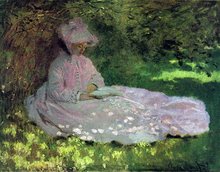"They came first for the Communists,
and I didn't speak up because I wasn't a Communist.
Then they came for the Jews,
and I didn't speak up because I wasn't a Jew.
Then they came for the trade unionists,
and I didn't speak up because I wasn't a trade unionist.
Then they came for the Catholics,
and I didn't speak up because I was a Protestant.
Then they came for me,
and by that time no one was left to speak up."
~Pastor Martin
Niemöller (1892–1984)
I'm sorry not to have posted sooner, especially since I am the one who chose the book (
yeesh!). This book was fascinating to me and, when describing it to various friends, the best words that I've come up to describe it are just that: "interesting" and "fascinating".
That being said, I have a true confession: I am a notorious End-of-the-Book reader, so to have Death "spoil" the ending for me was WEIRD!
lol. Seriously, I went to the back of the book and SURE ENOUGH, the bomb struck, "Papa" died, Rudy died...the
devastation occurred, just like Death said. Huh, I thought. And I have to admit, being a notorious End-of-the-Book reader, it DID change the way I read the book--in fact, it took something out of it for me. I know, it's COMPLETELY hypocritical, but true and I'm not really sure why it felt like that. Often, I read the end of the book because (as in the case of the Harry Potters or Eclipse, etc.,) I've gotten so involved (or obsessed!) in the story/characters that I start going a little wonky NOT knowing what's going to happen. So, with this book, KNOWING what's happening from the very very start messed with my head; so, even though I really really liked it, I didn't enjoy reading it as much as I wanted to, if that makes any sense. Probably not, but that's how weird I am. So anyways, it really became a bittersweet read knowing how much
Liesel was going to lose at then end, and I had to focus on the hope element that also ran throughout the book.
I enjoyed Death as the narrator (and loved Katie's review using the different breaks that were used...inspired, Miss Katie!) and thought how "interesting" to have that perspective...a third party trying to be detached and yet still emotionally involved telling the story and offering insights and helpful translations! (though I could see where a creepy-voiced Death on the audio would have been distracting to the poetical nuances that Death was so often spouting). The illustrations were a really interesting touch, too, didn't you think?
I think I must have unconsciously selected this book because of its subject matter--it brought back all the stuff I learned when I got my degree in history, as The Holocaust was my area of emphasis. Even then, the topic was is such a dark place to be so immersed and full of
sadness that I found myself looking for the bits of light of the era: the Resistance movement, survival stories, common links of humanity. That being said, the book really does effectively
illustrate all of that: the lowest levels we can sink to if we don't check ourselves and keep ourselves awake to what is happening around us, but also the startling acts that reveal the very best of humanity that any person is capable of (Rosa).
I felt the book was also true to the feelings that most Germans had--of accepting things that normally would have appalled them, because they seemed to happen, little by little, until it was too late. Also, amid all the denial that was going on was just LIFE...a boy wanting to kiss a girl, friendships, sports.... We get the same way, don't we? Preoccupied in what we are doing, places we need to go, things we need to do, and even the fear of getting involved, that we don't pay attention to our literal and figurative surroundings. Furthermore, the Germans at the time were still recovering
WWI's devastation (Death tries to capture that when characterizing Hans, I think) and the world wide Great Depression that affected them not only because they were so
in debt after the war, but because there was such loss of life and employment! The atmosphere in Germany seemed to not only crush them physically but emotionally and mentally, so of course Hitler was able to come to power; he seemed like a
charismatic light that would indeed bring about change, bring back their sense of "
volk" and pride. Lots of his early ideas fit the mood of the people and, especially, became
in sync with their need to blame SOMEONE for their plight.
Alrighty then. So now that I've digressed into a mini history lesson, let me just get back on target and say that this book helped me remember a lot and that context helped enrich the book for me.
I read somewhere that Markus
Zusak has written other, critically claimed books for young adults, but actually wrote this with an older audience in mind. I think that was evident in the overall mood of the book and think that it might be a bit much for a younger audience to handle (there was, after all, more swearing than I expected...sorry about that if it offended anyone). But I LOVE the Non
Sequitur cartoon Gina posted!!!! LOVED IT!!!! Because
Liesels' story is much like the
tattoo of the number of the old Holocaust Survivor...it helps us remember, and hopefully look at our world around us today. And for that, I enjoyed and appreciated this book.
:)
Laurenda


